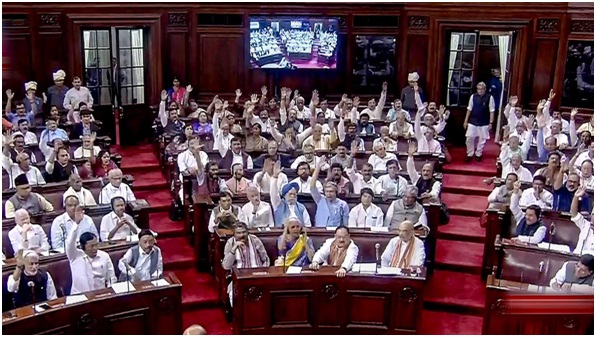Select Committee for Delhi Services Bill (The Hindu)

- 09 Aug 2023
Why in the News?
- Following complaints from a minimum of four Members of Parliament who expressed their objection to their names being added to a prospective Select Committee for the Delhi Services Bill without their prior consent, an important development unfolded.
- The proposition for the Select Committee had been put forth by Raghav Chadha, a Member of Parliament representing the Aam Aadmi Party (AAP), within the Upper House. Consequently, in light of these concerns, the Deputy Chairman of the Rajya Sabha made an announcement about initiating an inquiry into the matter.
Select Committee Overview:
- In India's Parliament, a diverse range of committees serves distinct functions.
- Among these, 12 Standing Committees are permanent entities, their members nominated periodically by the Chairman.
- Amit Shah's preference for the Privileges Committee to address the Raghav Chadha issue aligns with this category.
- Additionally, there exist ad hoc or temporary committees established for specific purposes, such as the examination of specific Bills, and their dissolution upon fulfilling their role.
- A Select Committee belongs to this transient category.
Select Committee Procedure:
- Although transient, a Select Committee adheres to a defined procedure outlined in the Rules of Procedure.
- According to Rule 125 of the Rajya Sabha Rules and Procedures, any member can propose an amendment, advocating Bill's referral to a Select Committee.
- This motion can originate from the Bill's sponsoring member or any other parliamentarian.
How members are chosen for a Select Committee:
- In accordance with the rules of the Rajya Sabha, Bills earmarked for Select Committees are accompanied by motions passed by the House, specifying the individuals designated for the Committee.
- When a motion proposes Bill's referral to a Select Committee, the House is responsible for appointing the Committee members.
- It is a foundational principle that no member can be included in a Select Committee unless they willingly participate.
- The onus lies with the proposer of the motion to confirm the intended member's willingness to serve on the Committee. While rules mandate obtaining a member's consent before their inclusion, they do not explicitly address the collection of signatures.
- The actual composition of a Select Committee is variable, differing across Committees.
- In the context of Joint Committees, members are apportioned in a 1:2 ratio between the Rajya Sabha and the Lok Sabha.
- The Chairman of the Committee is typically selected by the Chairman of the Rajya Sabha from among the Committee members.
- Additionally, the member or Minister overseeing the Bill is usually included as a Committee member.
What is the functioning process of a Select Committee?
- To commence proceedings, a minimum of one-third of the total committee members must be present, constituting a quorum.
- In instances where votes are tied on a particular issue, the chairman (or another designated presiding individual) holds the authority for a decisive or casting vote.
- For a focused examination of specific aspects linked to the Bill, a sub-committee may be established by a select committee.
- The committee's chairperson will endorse the report, which can include dissenting opinions from any member.
- Following endorsement, the report and any dissenting viewpoints will be submitted, printed, and circulated among all members of the Rajya Sabha."
What are the roles of a Select Committee?
- The core responsibility of the Committee involves meticulously reviewing each clause within the Bill's text.
- This is carried out to ensure that the Bill effectively captures the original intention and proposed objectives.
- To facilitate this, the Committee can call upon experts, interested parties, and organizations for written input or oral testimonies.
- Furthermore, the Committee possesses the authority to seek elucidation from government officials regarding the underlying policy of different provisions in the Bill, as well as to obtain necessary background information.
- Upon collecting and analyzing the evidence, the Committee deliberates on the Bill's individual components and crafts its conclusions, potentially amending clauses as necessary.
- Additionally, the Committee holds the prerogative to physically visit relevant institutions and organizations to gain firsthand insights into matters tied to the Bill."
What happens following the submission of a Select Committee's report?
- The committee's report holds a suggestive character, allowing the government the flexibility to adopt or decline the recommendations presented.
- Furthermore, a Select Committee has the option to present its revised iteration of the Bill.
- Should this transpire, the minister responsible for the respective Bill can propose that the committee's version of the Bill be deliberated upon and approved within the legislative assembly."
Importance of Parliamentary Committees?
- Expertise in Legislation:
- Given that many Members of Parliament lack specialized knowledge in specific fields, relying on insights from experts and stakeholders is crucial for informed decision-making.
- Parliamentary committees play a pivotal role in aiding MPs to access expertise and allocate sufficient time to thoroughly analyze issues.
- Simulating Parliament's Functions:
- These committees effectively emulate the functions of the larger parliamentary body.
- Comprising MPs from various parties, they are elected using the single transferable vote method, reflecting the overall party distribution in Parliament.
- Thorough Examination Tool:
- Bills directed to these committees undergo meticulous scrutiny, with active engagement from external stakeholders, including the general public, to solicit diverse perspectives.
- Government Oversight Mechanism:
- Despite non-binding recommendations, committee reports serve as public records of inclusive consultations.
- They compel the government to reevaluate contentious provisions, adding a degree of accountability.
- Fostering Collaborative Discussions:
- Conducted behind closed doors, committee meetings encourage collaborative discussions among MPs.
- The absence of public scrutiny diminishes the need for grandstanding, enabling more productive exchanges."
